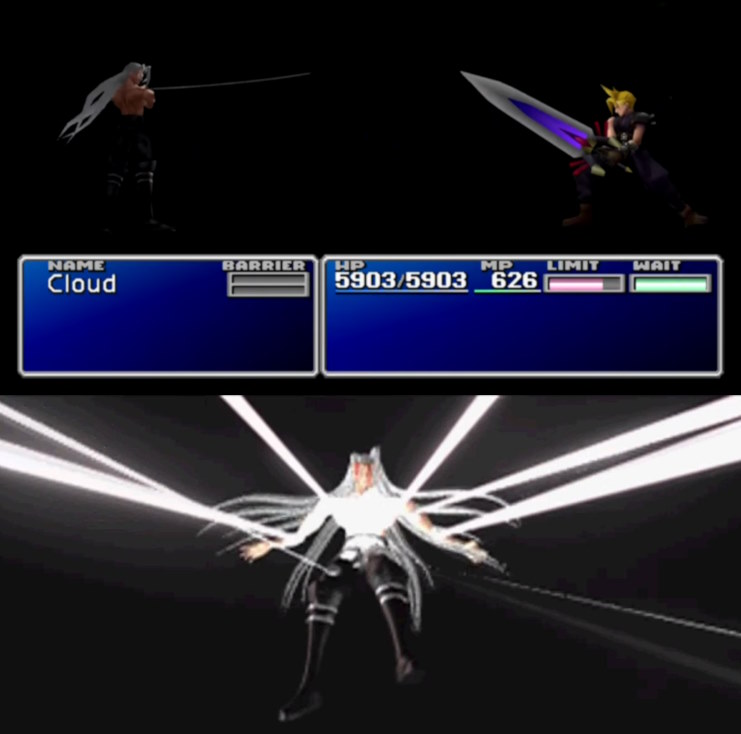Final Fantasy VII is about two men who discover they aren’t the heroes they wanted to be. The game is about other things - war, capitalism, ecocide to name a few - but I think how these men address their shame, and compete to overcome it, is its real engine.
I recently replayed the 1997 original as a way of preparing for Remake and Rebirth. I wanted a frame of reference and a way back into its story. But I was also surprised at how well it held up, 25 years later, and began to notice the plot details and narrative subtleties I overlooked when I was younger.
And so I found myself asking a question - why does Sephiroth lie? Why - exactly - does Sephiroth pretend that Cloud was never a real person? The answer I came to, put a new turn on a story I’d taken long for granted.
Sephiroth’s lie

I should be clear here. Cloud Strife is certainly a fantasist. He pretends to be a SOLDIER First Class and Sephiroth’s personal protege, witnessing the Nibelheim incident first hand. He fakes the life of an elite ex-SOLDIER. In truth, he flunked SOLDIER recruitment and was only at Nibelheim as a masked, anonymous grunt. Whilst he did confront Sephiroth, and even killed him, the rest of his story is stolen from Zack.
…But you probably already knew that.
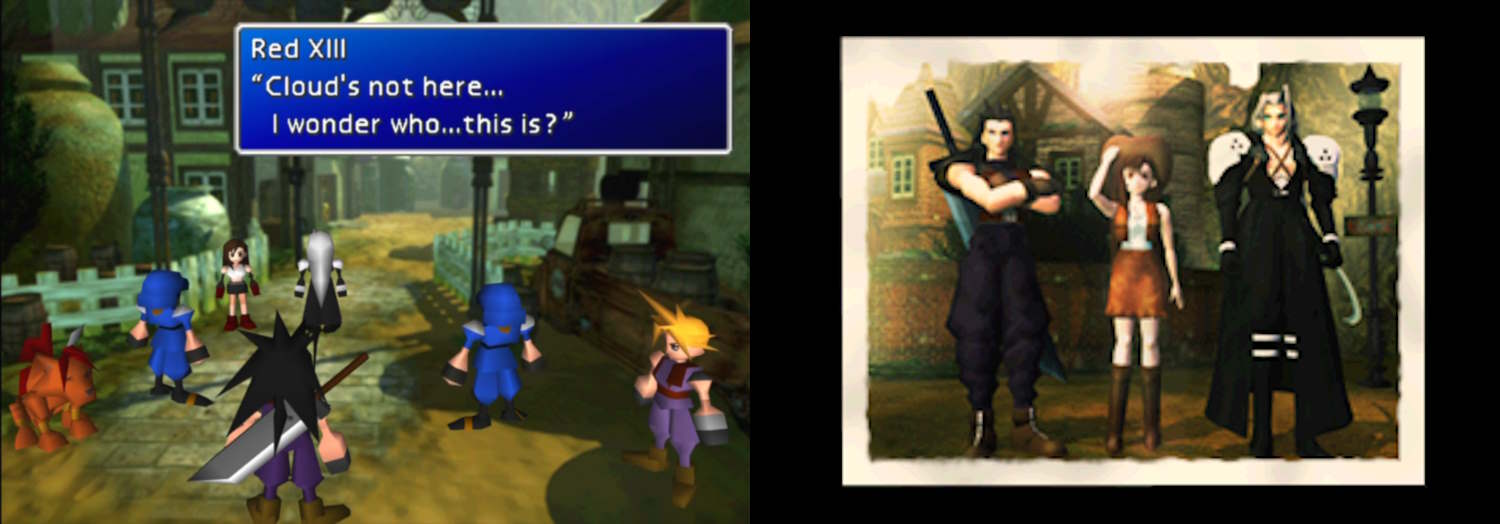
The thing is, Sephiroth doesn’t just taunt Cloud with the truth. He goes a step further and says Cloud was never a real person to begin with. Just a clutch of mutant Jenova cells, constructed five years ago and assembled with Tifa’s memories. Why?

I’ve heard some folk say it’s revenge for Cloud humiliating Sephiroth in combat. But I don’t think revenge is enough of a reason. If Sephiroth wanted to, he could brutalise Cloud quite easily.
No, I think that to understand Sephiroth’s sadism, you have to understand Sephiroth’s shame. Sephiroth is subjecting Cloud to his own shame at discovering he’s a constructed being, whose achievements aren’t even his own.
Who IS Sephiroth?
When we’re introduced to Sephiroth, the Wutai War is over. The celebration of war heroes is fading away. It’s just as Cloud says: “How does it feel, MISTER Sephiroth?”. With no hometown or parents, and his status now fading, Sephiroth is a man at risk of losing his identity.
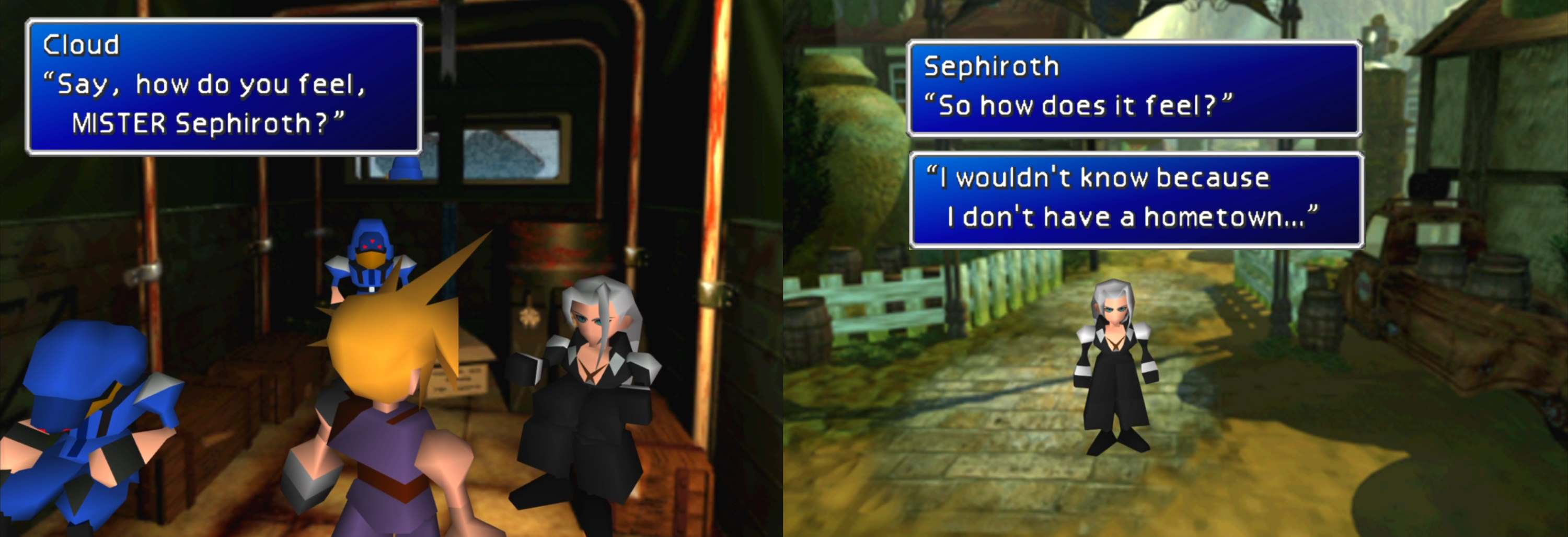
Above: Cloud and Sephiroth ask mirrored questions about their feelings of identity
This question is what frames the Nibelheim incident, the experience they shared. It’s about Cloud and Sephiroth’s crises of identity.
At Nibelheim, Cloud and Sephiroth are shamed. Cloud is devastated by his failure to protect Tifa. Sephiroth discovers he’s a puppet, a manufactured being, and everything he thought he achieved, really belongs to Shinra and a scientist he despises. But they deal with their shame in opposing ways.
Cloud chooses denial. He steals the sword and the story of Zack Fair, a better hero than Cloud ever was. (Even the name “Zack Fair” sounds more honorable than “Cloud Strife”). He cobbles Zack’s war stories into a fake persona and lives a mercenary fantasy.
Sephiroth, on the other hand, embraces his truth. If he’s not human, why can’t he be superhuman? Like teenaged Cloud, he responds to humiliation with an ego-defending superiority complex. Sephiroth adopts the persona of a gleeful sadist, exactly the monster he sees in himself.
But Sephiroth is a fake man too. Literally. Every time we see him, between the Flashback and the Whirlwind Maze, it’s really just Jenova taking Sephiroth’s form. The game doesn’t do a great job of explaining this, but it’s the reason we keep meeting Sephiroth and then fighting Jenova. These forms we meet are just carbon copies of Sephiroth as he used to be - the real Sephiroth is a half-dissolved torso, a corpse in a mako crystal.
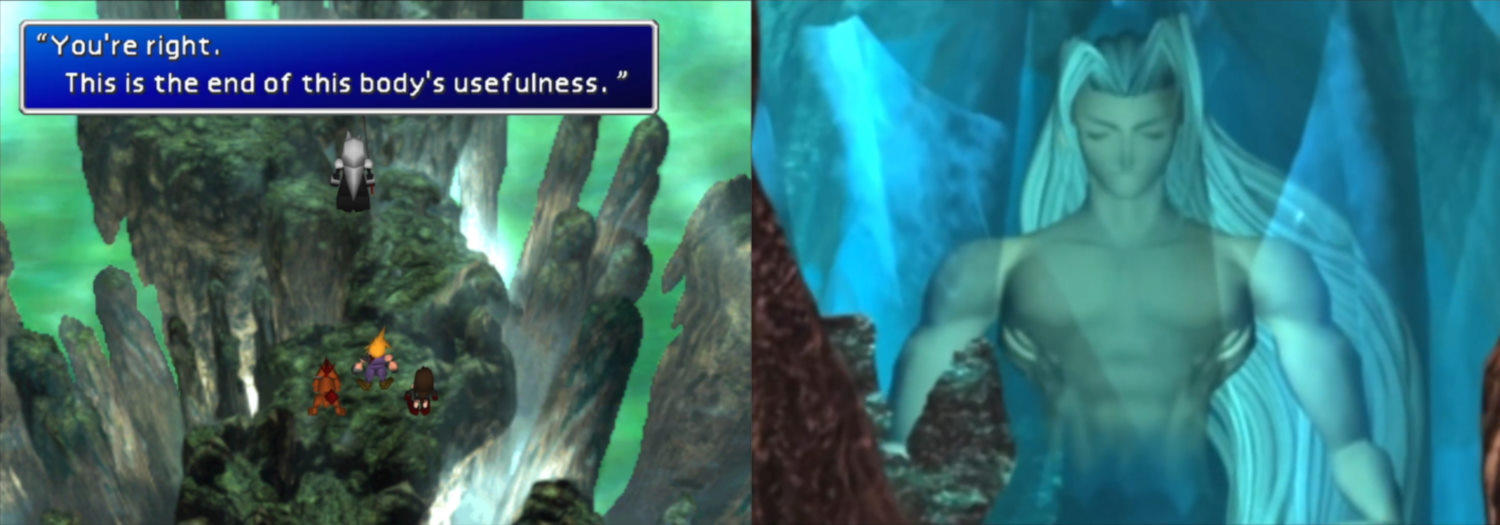
If Sephiroth has a “thing”, throughout the FFVII Compilation, it’s his obsessive compulsion to re-create his image over and over. Through clones or hosts or mental projection, Sephiroth’s quote-unquote “superpower” is that his image has to persist through death. The same perfect body, over and over, never aging or dying.
It’s a mirror of Cloud’s own ego-protecting fantasy life. Neither man can let go of his self-image.
Sephiroth despises Cloud, I think, because Cloud is a fake man just like Sephiroth was, and he isn’t even ashamed. It’s projection: he says Cloud is a monster, a puppet, a fraud because that’s exactly how he witnesses himself. A half-human Shinra-manufactured fraudulent war hero. And that’s where his compulsion comes from, to regenerate his damaged self-image.
Truth versus illusion
But eventually, Cloud and Sephiroth’s contradicting stories have to collide. At the Whirlwind Maze, Sephiroth destroys Cloud’s fantasy because truth is more powerful than denial. He confronts Cloud with the inconsistencies in his story and forces Cloud to experience shame. He wants Cloud to feel exactly as he does, and that’s why he lies about Cloud’s origins.
Overwhelmed by the contradictions in his memories and compelled to hand over the Black Materia, Cloud is metaphorically and literally buried alive when the life-tree collapses and Sephiroth pulls them both underground.
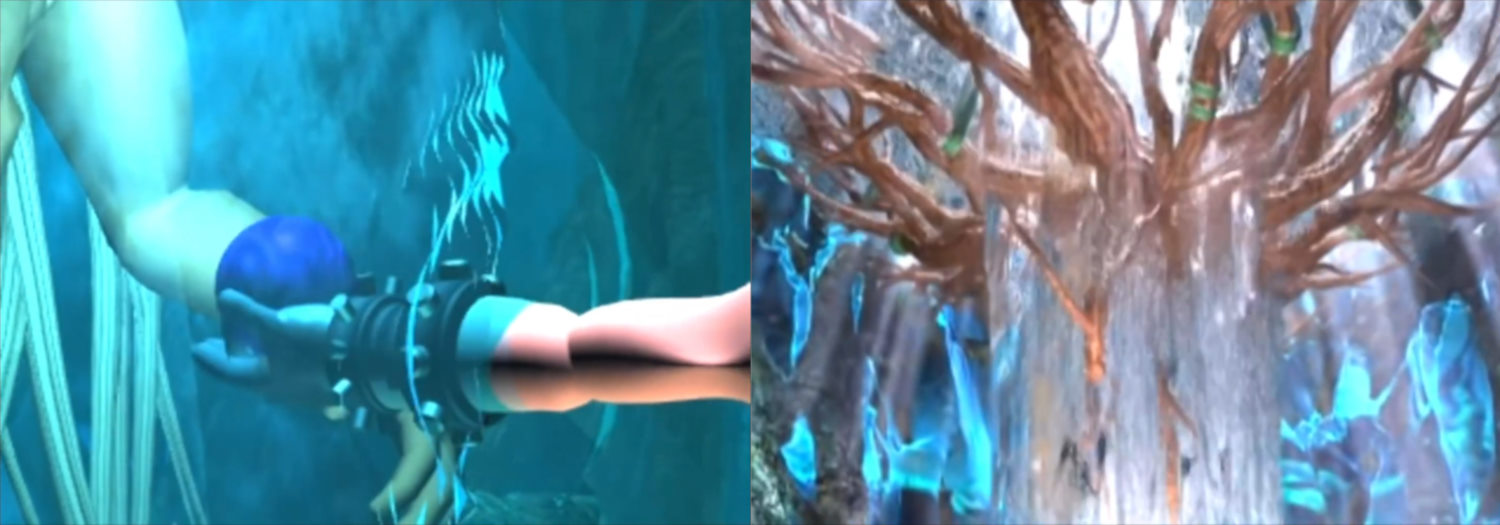
With Tifa’s guidance, though, Cloud is able to recover. Painfully at first, he acknowledges his failures and opens up to his friends. He’s humble and accepts the mistakes of his past, without using it as an excuse to shirk responsibility for the present.
The “Great Sephiroth” can’t do that though. Sephiroth hides behind his half-alien heritage as an excuse. He knows well into the game that he’s no Cetra, he would just rather destroy the planet, and erase his past, than live in a world that humiliates him.
And ultimately, that’s why he loses.
Endgame
Deep in the planet’s core, Cloud confronts Sephiroth for the third and final time. Sephiroth has no dialog after the Whirlwind Maze - now that Cloud understands the truth, he has nothing left worth saying.
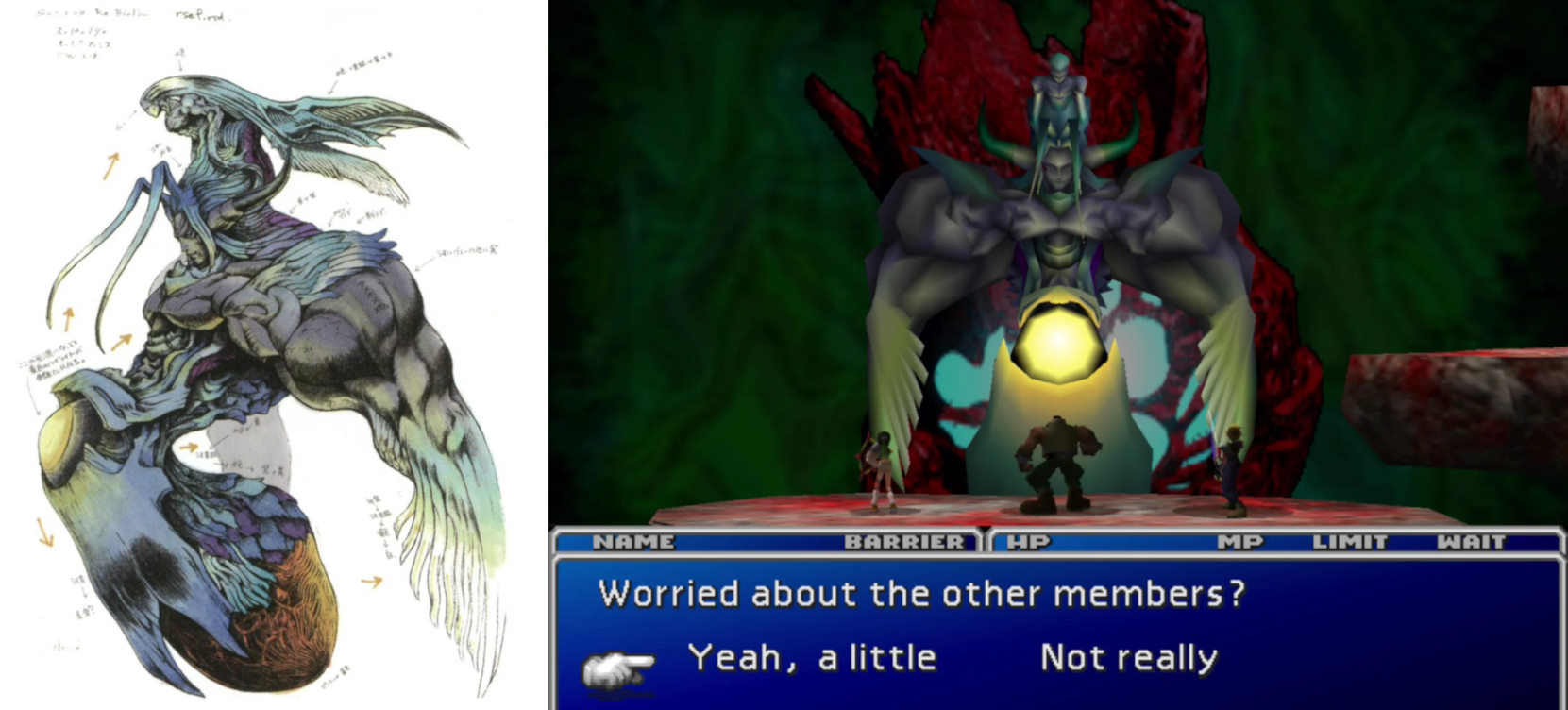
So Sephiroth reveals his “Bizarro” form. I think this grotesque, bulbous mess is actually the real Sephiroth. The torso that remains of him is at the top and appears to be birthing his own, giant, undead body. This is the game’s only multi-team battle which illustrates Cloud’s journey, choosing friendship over narcissism.
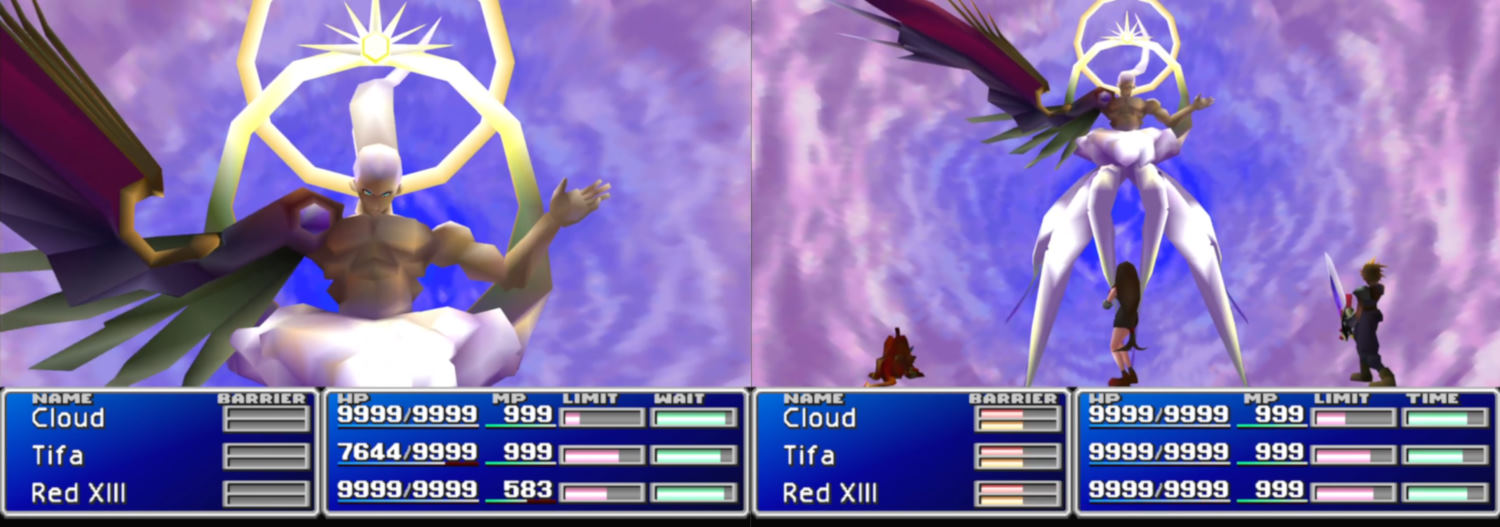
The battle culminates in a showdown with the angelic “Sepher” Sephiroth. The fake man has reinvented himself as a fake god. The location is nonsensical: a floating sky palace actually deep underground. A backing track choir sings his praises in Latin as a “generous, glorious” god. He fights with illusions, at one point he appears to do no less than temporarily destroy the entire solar system.
This fight is full of ironies. Even in his ‘perfect body’, Sephiroth is still missing his legs. Literally half a man, Sephiroth now wears a fake halo and a model star - in his grandest illusion, his godhood is only a costume. It’s like his self-image, permanently maimed by his defeat at Nibelheim, can’t fully compensate for his shame. That face is the rage of someone humiliated, someone seen.
Shame is the secret weakness of Sephiroth’s soul. The compulsion to project his image over and over, initially a super power, ultimately traps him. He can’t escape his wounded self-image the way Cloud can, he’s compelled to project illusions in defence of his ego. But illusions are no match for reality. Defeated, Safer-Sephiroth’s illusory body shatters into pieces and dissolves into air - literally, a hollow man.

It’s these themes that are underscored in the finale. Visually abstract, and shrouded in darkness, this one-on-one fight is depicted as some last, psychological projection. But the battle was never merely physical. Having overcome the folly in his mind, Cloud unlocks his full potential, and breaks Sephiroth’s ghost into nothing but light.
